|
observer |
|
|
|
|
|
OTHER LINKS |

|

|

|
|
Glimpse of history from the ANCL archives: Jawaharlal Nehru's memorable visits to Sri Lanka
A moment comes, which comes but rarely in history, when we step out from the old to the new, when an age ends, and when the soul of a nation, long suppressed, finds utterance. It is fitting that at this solemn moment we take the pledge of dedication to the service of India and her people and to the still larger cause of humanity, said Jawaharlal Nehru on August 14, 1947 when India became independent after 182 years of British rule. A statesman, and an intellectual the first Prime Minister of independent India, Jawaharlal Nehru visited Sri Lanka twice; first a holiday in 1931 and another visit in 1939. Nehru's biographical notes reveal his thoughts and inspirations on Sri Lanka (then Ceylon). Nehru wrote "My doctors urged me to take some rest and go for a change, and I decided to spend a month in Ceylon. India, huge as a country is, did not offer real prospect of change or mental rest, for wherever I might go, I would probably come across political associates and the same problem would pursue me.
And yet we did not really have much rest in Ceylon, except for two weeks at Nuwara Eliya. We were fairly overwhelmed by the hospitality and the friendliness of all classes of people there. It was very pleasant to find all this goodwill, but it was often embarrassing also. At Nuwara Eliya groups of labourers, tea-garden workers and others would come daily, walking many miles, bringing gracious gifts with them-wild flowers, vegetables, and home-made butter. We could not, as a rule, even converse together; we merely looked at each other and smiled. Our little house was full of these precious gifts of theirs, which they had given out of their poverty, and we passed them on to the local hospital and orphanages. We visited many of the famous sights and historical ruins of the island, the Buddhist monasteries, and rich tropical forests. At Anuradhapura, I liked greatly an old seated statue of the Buddha. A year later, when I was in Dehra Dun Gaol, a friend in Ceylon sent me a picture of this statue, and I kept it on my little table in my cell. It became a precious companion for me, and the strong, calm features of the Buddha's statue soothed me and gave me strength and helped me to overcome many a period of depression.
I saw many Buddhist bhikkus (monks) in their monasteries and on the highways, meeting with respect wherever they went. The dominant expression of almost all of them was one of peace and calm, a strange detachment from the cares of the world. They did not have intellectual faces, as a rule and there was no trace of the fierce conflicts of the mind on their countenances. It seemed to be a smooth flowing river moving slowly to the great ocean. I looked at them with some envy, with just a faint yearning for a haven, but I knew well enough that my lot was a different one, cast in storms and tempests. There was to be no haven for me, for the tempests within me were as stormy as those outside. And if perchance I found myself in a safe harbour, protected from the fury of winds, would I be contended or happy there?
So many memories come back to me of the land and her people; they have been pleasant companions during the long, empty days in prison. The little incident lingers in my memory; it was near Jaffna, I think. The teachers and boys of a school stopped our car and said a few words of greeting. The ardent, eager faces of the boys stood out, and then one of them came to me shook hands with me, and without questioning or argument said, "I will not falter." That bright young face with shining eyes, full of determination, is imprinted in my mind. I do not know who he was; I have lost trace of him. But somehow I have the conviction that he will remain true to his word and will not falter when he finds life's difficulties." **** About Jawaharlal Nehru
Jawaharlal Nehru was born on Nov. 14, 1889, in Allahabad into a proud, learned Kashmiri Brahmin family. His father, Motilal Nehru, was a wealthy barrister and influential politician. Jawaharlal was an only child until the age of 11, after which two sisters were born. The atmosphere in the Nehru home was more English than Indian where only English was spoken. It was also a luxurious home, with an impressive stable and two swimming pools. Jawaharlal was educated at home by tutors, most of them English or Scottish. Under the influence of a tutor Nehru joined the Theosophical Society at 13. At the age of 15 Nehru left for England, where he studied at Harrow and Cambridge and then for the bar in London. He was called to the bar in 1912. His English experience reinforced his elegant and cosmopolitan tastes. As Nehru said of himself at Cambridge, "In my likes and dislikes I was perhaps more an Englishman than an Indian." In London he was attracted by Fabian ideas; nationalism and socialism from this time on became his intellectual motive force. A close friend and supporter of Mohandas Gandhi, Nehru became India's first Prime Minister, serving from 1947 until his death in 1964. Nehru favoured making India into an industrialized, socialistic state and tried to follow a policy of neutralism in foreign affairs. |
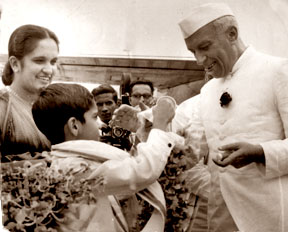 Long years ago we made a tryst with destiny, and now the time comes
when we shall redeem our pledge, not wholly or in full measure, but very
substantially. At the stroke of the midnight hour, when the world
sleeps, India will awake to life and freedom.
Long years ago we made a tryst with destiny, and now the time comes
when we shall redeem our pledge, not wholly or in full measure, but very
substantially. At the stroke of the midnight hour, when the world
sleeps, India will awake to life and freedom. 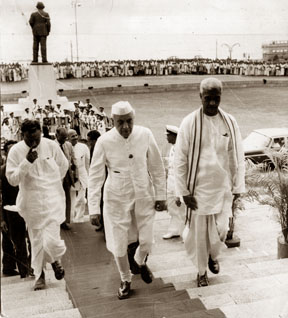 Ceylon was the nearest place within reach of India and so to Ceylon
we went-Kamala, Indira and I. That was the first holiday I had since our
return from Europe in 1927, the first since then that my wife and
daughter and I holidayed together peacefully with little to distract our
attention. There has been no repetition of that experience, and some
times I wonder if there will be any.
Ceylon was the nearest place within reach of India and so to Ceylon
we went-Kamala, Indira and I. That was the first holiday I had since our
return from Europe in 1927, the first since then that my wife and
daughter and I holidayed together peacefully with little to distract our
attention. There has been no repetition of that experience, and some
times I wonder if there will be any. 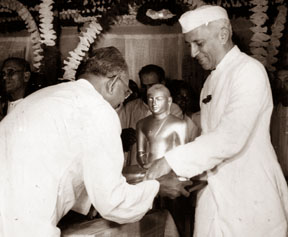 Buddha has always had a great appeal for me. It is difficult to
analyse this appeal, but it is not a religious appeal, and I am not
interested in dogmas that has grown up round Buddhism. It is the
personality that has drawn me. So also the personality of Christ that
has attracted me greatly.
Buddha has always had a great appeal for me. It is difficult to
analyse this appeal, but it is not a religious appeal, and I am not
interested in dogmas that has grown up round Buddhism. It is the
personality that has drawn me. So also the personality of Christ that
has attracted me greatly. 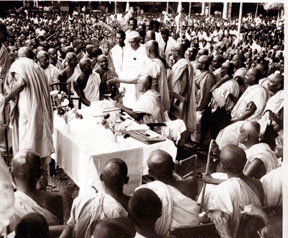 For a little while the harbour was pleasant, and one could lie down
and dream and allow the soothing and enervating charm of the tropics
steal over one. Ceylon fitted in with my mood then, and the beauty of
the island filled me with delight. Our month of holiday was soon over,
and it was with real regret that we bade good-bye.
For a little while the harbour was pleasant, and one could lie down
and dream and allow the soothing and enervating charm of the tropics
steal over one. Ceylon fitted in with my mood then, and the beauty of
the island filled me with delight. Our month of holiday was soon over,
and it was with real regret that we bade good-bye. 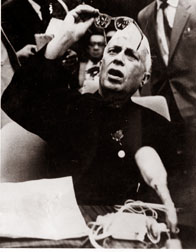 Jawaharlal Nehru (1889-1964) was a great Indian nationalist, a
nationalist in the true sense who believed in unity in diversity and a
leader who worked for independence and social reform. He became the
first Prime Minister of independent India, a position he retained until
his death. He initiated India's nonalignment policy in foreign affairs.
Jawaharlal Nehru (1889-1964) was a great Indian nationalist, a
nationalist in the true sense who believed in unity in diversity and a
leader who worked for independence and social reform. He became the
first Prime Minister of independent India, a position he retained until
his death. He initiated India's nonalignment policy in foreign affairs.








